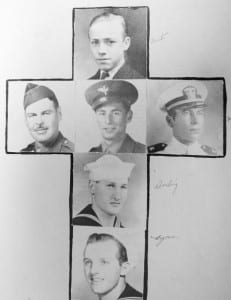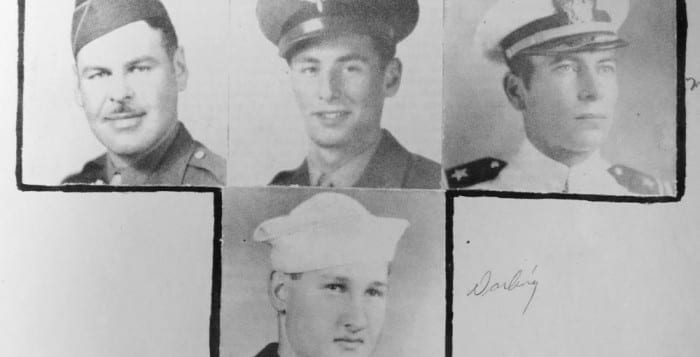By Beverly C. Tyler
Anthony Matusky received his wings at Pensacola, Fla., in 1941. His sister, Mary Matwell, remembered that Anthony had said that he trained off Greenland in the unit with Joseph Kennedy. At the time of his death, Anthony was stationed on the Trinidad Naval Base as a pilot in a naval patrol squadron engaged in patrolling for enemy submarines, which were taking a heavy toll of shipping in the Caribbean.
“The Navy Department has notified Mrs. John Matusky, of Setauket, that her son, Lieut. Anthony R. Matusky, U.S.N.R., reported missing in action last August [1943], has been awarded the Distinguished Flying Cross, highest aviation honor, in recognition of the following service: ‘For heroism and extraordinary achievement while participating in aerial flight as a pilot attached to a Patrol Squadron during a coordinated attack on an enemy submarine in the Caribbean Sea . . . His cool courage and superb airmanship in the face of danger contributed decisively to the eventual destruction of the enemy submarine and the capture of her crew.”
— New York Journal American, 1944
As reported in the November 1945 issue of The Reader’s Digest by Pulitzer Prize winning writer Ira Wolfert, in an article titled “The Silent, Invisible War Under the Sea,” the German submarines were an effective tool in destroying the supply arm of the Allied efforts, sinking 1,161 merchant vessels in 1942. Their subs basically owned the Atlantic until an effective strategy was developed using aircraft and radar to find submarines recharging their batteries on the surface and the ideal attack procedures to cripple and sink them.
On the night of Aug. 5, 1943, a patrol plane out of Trinidad Naval Base spotted a sub and made an attack as the sub crash-dived. The Mariner aircraft then kept the sub in radar contact all night but it did not surface again. As detailed by Wolfert, “At dawn [the patrol plane] running low on gas was replaced by Lieut. A.R. Matuski. For seven and a half tedious hours, Matuski plied back and forth and around a square of ocean, figuring how he would maneuver if he were a sub skipper who had been down so and so many hours in such and such currents and this and that kind of sea, and making his gambit accordingly.
“Matuski was a boy who knew his business. At 1321 hours (1:21 p.m.) Trinidad Naval Base got a sub contact report from him, giving longitude and latitude, adding ‘I am going in to attack.’
‘1330’ he radioed, ‘sub damaged, bow out of water, making only about two knots.
‘1335: sub bow sank.
‘1337: no casualties to plane or personnel.
‘1348: Damaged. Damaged. I am on fire.’”

There were no other transmissions from Lt. Matusky’s aircraft and no trace of the pilot or crew of 10 was ever found. Trinidad sent another aircraft to keep up the pressure on the sub and as detailed by Wolfert, “[The next naval patrol bomber] reached the position given by Matuski and 20 minutes later picked up the enemy pip on his radar. When he got in visual range, he could see that Matuski had done his last work well. The sub’s stern was down, its bow up, and it was lumbering across the sea.”
Together with an additional naval aircraft, a blimp and finally an army bomber the sub was sunk. Navy destroyers picked up 40 sub survivors the next morning.
Anthony was killed during the war but his four brothers returned home, all five honored. Anthony’s name is engraved on the monuments on the Setauket Village Green and the East Setauket Memorial Park along with the other seven men from Setauket who died in WWII.
Two men from the local area gave their lives in WWI, Raymond Wishart and Harry Golden. A massive boulder and south-facing bronze tablet were erected on the Setauket Village Green in their memory. The boulder was brought from Strong’s Neck and the plaque was designed by the well-known artist William DeLeftwich Dodge who painted the murals on New York history that are in the state capital in Albany.
On the opposite side of the rock is a plaque that was placed there after WWII. It reads, “1941-1945 In memory of Clifford J. Darling, Henry P. Eichacker, Francis S. Hawkins, David Douglas Hunter, Orlando B. Lyons, Anthony R. Matusky, Edward A. Pfeiffer, (and) William E. Weston of the United States Armed Forces who gave their lives in World War II.” On the memorial in East Setauket is also listed the local serviceman Chris F. Brunn who died in Vietnam.
We have a lot to be thankful for during this time of Thanksgiving. We have a very special community here in the hamlets of Setauket and Stony Brook and the villages of Old Field and Poquott. Let us never forget the sacrifice made by these men, by those service men and women from our community who were injured physically and/or mentally, and by all the men and women who served in war and in peacetime to keep us safe and free.
Beverly Tyler is the Three Village Historical Society historian.





